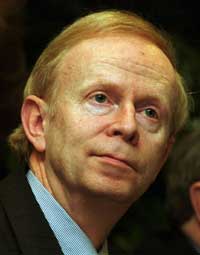30 June 2005 Edition
Mixed messages
BY LAURA FRIEL

Newly-elected leader of the UUP Reg Empey announced one of his key objectives would be to push the parading issue to the top of the political agenda
Nationalists are getting mixed messages from the Orange Order, while in Derry Orangemen have successfully negotiated accommodation through a mechanism of engagement with their nationalist neighbours, all the signs of a standoff are emerging in Belfast. And not surprisingly Ian Paisley's DUP and UUP rivalry is playing a significant role.
A scheduled Orange Order march in West Belfast was postponed by the Order after the parade was re routed a few hundred yards. The Order had proposed to march onto the Springfield Road at Workman Avenue close to a nationalist residential area but was re-routed by the Parades Commission to emerge further down through gates at the former Mackies site.
Of course compromise is not something to which Orangemen are 'traditionally' committed. The decision to postpone the parade in protest was announced by the formally unknown Order's North and West Belfast Forum. Instead the Order announced a protest by the local lodge in the Shankill.
Announcing the decision Tommy Cheevers said "there has been a deliberate attempt to humiliate and demean our community. We are aware of the deep hurt that has been caused to our people."
Cheevers went on to announce a "campaign to highlight the persecution of our people and our culture". The decision of political unionism to play on irrational fears is all the more grotesque given the fact that the Shankill community is just emerging out of the blood and violence of unionist paramilitary feuding.
The Orange Order announced its determination to march, without restrictions, along the Springfield Road this summer despite cutting off all dialogue with nationalist residents and the Parades Commission. DUP MLA Nelson McCausland dismissed the Commission and nationalist residents‚ groups as "dishonest" and "unreliable".
McCausland said the Orange Order would now work to a secret strategy to ensure it was able to hold a parade through Workman Avenue later this year. "The protest parade is only the start," he said.
On Saturday, over a thousand Orangemen, accompanied by 20 bands, paraded on the Shankill Road "to demonstrate their anger and frustration" at being required to consider their Catholic neighbours. And it was very much a DUP affair.
A stronghold of unionist paramilitaries, the people of the Shankill have a troubled relationship with the DUP. The DUP might have been keen to let the people of the Shankill do their dirty work, but they were equally keen to take no political responsibility, often leaving the Shankill without unionist mainstream representation.
More recently, the DUP's anti-Agreement stance has secured sufficient support in the Shankill to secure an MLA seat for Diane Dodds. And after all, stirring up trouble in the Shankill is something Ian Paisley has done before. Sectarian confrontation has been an essential ingredient of Paisley's politics and in 1959 he provoked one in Belfast that led to some of the worst anti-Catholic violence witnessed by the city in years.
In June 1959, Paisley addressed a rally in the Lower Shankill. A large crowd, mostly of young people, had been gathered by the sound of an Orange band. At the rally Paisley upbraided the crowd for allowing a handful of Catholics to live and work within the district. Paisley went on to name each house and business in which "the Pope's men" abided and predictably the crowd went on to attack those homes and premises, smashing windows and daubing "Taigs out" on the doors.
Stirring up Orangemen and their supporters was much the same message during last Saturday's protest rally. A DUP delegation, including West Belfast MLA Diane Dodds and her husband Nigel Dodds and Nelson McCausland, both MLAs for North Belfast, demanded unionists' rights were "recognised and upheld".
Instead of using political leadership to allay irrational fears about the significance of a few hundred yards' detour, the DUP opted for the usual rabble rousing. In a party statement, the DUP said their purpose "will be to lay out the severe strains that have been placed on our people by the disgraceful attacks on legal and peaceful parades and the bizarre and disgraceful actions of the Parades Commission.
"There is a clear responsibility on the [British] government to tackle the issue of parades and not hide behind the un-elected and unaccountable quango which is causing instability and anger on the streets."
Empey seizes on parades
Eager to play catch up to the DUP initiative of inflaming the political situation on the streets of Belfast, newly-elected leader of the UUP Reg Empey announced one of his 'key objectives' would be to push the parading issue to the top of the political agenda.
"The Parades Commission by their actions, have advertently or inadvertently," (the UUP likes to hedge its bets) "created more problems, antagonised members of the Orange Order and created confusion and mistrust over what constitutes a legal or illegal parade," said Empey.
Curiously creating unnecessary antagonism, confusion and mistrust appears to be precisely the strategy currently being pursued by rejectionist unionism.
Accusing the British Government of hiding behind obtuse language (it was ever thus) Empey complained that the parades issue had become "political" in recent years, conveniently ignoring the role political unionism has been playing in this.
Sinn Féin's Alex Maskey welcomed the decision to postpone the Whiterock parade and said the Orange Order would have to negotiate with residents and "treat them with respect" if they wanted an agreed parade. "Stop the play actin



